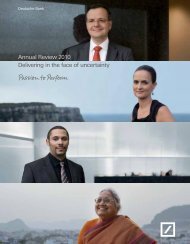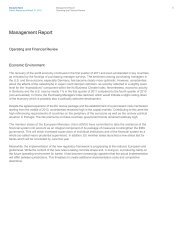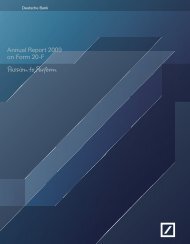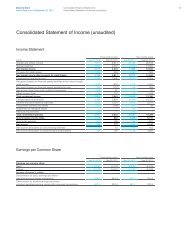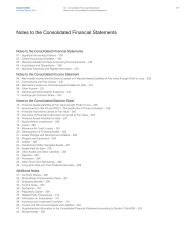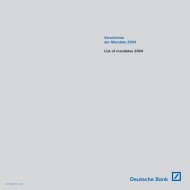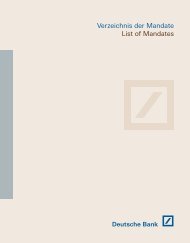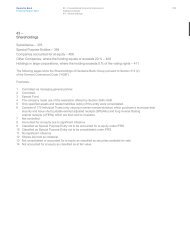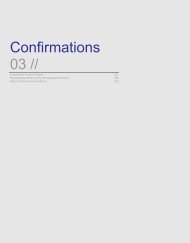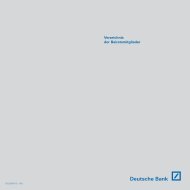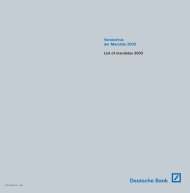SEC Form 20-F - Deutsche Bank Annual Report 2012
SEC Form 20-F - Deutsche Bank Annual Report 2012
SEC Form 20-F - Deutsche Bank Annual Report 2012
Create successful ePaper yourself
Turn your PDF publications into a flip-book with our unique Google optimized e-Paper software.
<strong>Deutsche</strong> <strong>Bank</strong><br />
<strong>Annual</strong> <strong>Report</strong> <strong>20</strong>10 on <strong>Form</strong> <strong>20</strong>-F<br />
Item 8: Financial Information 121<br />
have to pay under its suggested structure. In respect of the credit default element of the Swap, the City claims<br />
future reimbursement of any amount it would have to pay under Swap on the occurrence of any credit event or<br />
on the occurrence of an early redemption of the credit default element. In the event that the Court does not<br />
grant the above damages, the City claims € 88.8 million in respect of alleged “hidden” fees embedded into the<br />
Swap and not less than € 150 million as general compensation for damages arising from the Swap. The claims<br />
are made jointly and severally against each of the <strong>Bank</strong>s. A first hearing is scheduled for March 9, <strong>20</strong>11.<br />
In March <strong>20</strong>10, at the Milan Prosecutor’s request, the Milan criminal court approved the criminal indictment of<br />
each of the <strong>Bank</strong>s and certain of their employees (including two current employees of <strong>Deutsche</strong> <strong>Bank</strong>). The<br />
indictments are for alleged criminal offences relating to the Transaction, in particular fraud against a public<br />
authority. The Milan Prosecutor some time ago seized certain assets of the <strong>Bank</strong>s in anticipation of such a trial,<br />
including € 25.1 million in cash from <strong>Deutsche</strong> <strong>Bank</strong>. The Milan Prosecutor considers this sum to be equivalent<br />
to <strong>Deutsche</strong> <strong>Bank</strong>’s proceeds from the alleged fraud, and it is subject to confiscation (and could be increased<br />
or reduced) should the judge so decide following the trial. The trial is now underway. It is not possible at this<br />
stage to estimate when a verdict will be reached.<br />
KOSPI Index Unwind. Following the decline of the Korea Composite Stock Price Index <strong>20</strong>0 (“KOSPI <strong>20</strong>0”) in<br />
the closing auction on November 11, <strong>20</strong>10 by approximately 2.7 %, the Korean Financial Supervisory Service<br />
(“FSS”) commenced an investigation and expressed concerns that the fall in the KOSPI <strong>20</strong>0 was attributable to<br />
a sale by <strong>Deutsche</strong> <strong>Bank</strong> AG (“<strong>Deutsche</strong> <strong>Bank</strong>”) of a basket of stocks, worth approximately € 1.6 billion, that<br />
was held as part of an index arbitrage position on the KOSPI <strong>20</strong>0. On February 23, <strong>20</strong>11, the Korean Financial<br />
Services Commission, which oversees the work of the FSS, reviewed the FSS’ findings and recommendations<br />
and resolved to take the following action: (i) to file a criminal complaint to the Korean Prosecutor’s Office for<br />
alleged market manipulation against five employees of the <strong>Deutsche</strong> <strong>Bank</strong> Group and <strong>Deutsche</strong> <strong>Bank</strong>’s<br />
subsidiary <strong>Deutsche</strong> Securities Korea Co. (“DSK”) for vicarious liability; and (ii) to impose a suspension of six<br />
months, commencing April 1, <strong>20</strong>11, of DSK’s business for proprietary trading of cash equities and listed<br />
derivatives and DMA (direct market access) cash equities trading, and the requirement that DSK suspends the<br />
employment of one named employee for six months. There is an exemption to the business suspension to<br />
permit DSK to continue acting as liquidity provider for existing derivatives linked securities. The Korean<br />
Prosecutor’s Office will now undertake its own investigation to determine whether to indict DSK and/or the<br />
relevant employees.<br />
Dividend Policy<br />
We generally pay dividends each year. However, we may not pay dividends in the future at rates we have paid<br />
them in previous years. In particular, the dividend proposed for <strong>20</strong>10 is € 0.75, compared to dividends paid of<br />
€ 0.75 for <strong>20</strong>09 and € 0.50 for <strong>20</strong>08. If we are not profitable, we may not pay dividends at all. If we fail to meet<br />
the capital adequacy requirements or the liquidity requirements under the <strong>Bank</strong>ing Act, the BaFin may suspend<br />
or limit the payment of dividends. See “Item 4: Information on the Company – Regulation and Supervision –<br />
Regulation and Supervision in Germany”.<br />
Under German law, our dividends are based on the unconsolidated results of <strong>Deutsche</strong> <strong>Bank</strong> AG as prepared<br />
in accordance with German accounting rules. Our Management Board, which prepares the annual financial<br />
statements of <strong>Deutsche</strong> <strong>Bank</strong> AG on an unconsolidated basis, and our Supervisory Board, which reviews them,<br />
first allocate part of <strong>Deutsche</strong> <strong>Bank</strong>’s annual surplus (if any) to our statutory reserves and to any losses carried<br />
forward, as it is legally required to do. For treasury shares a reserve in the amount of their value recorded on<br />
the asset side must be set up from the annual surplus or from other revenue reserves. They then allocate the<br />
remainder between other revenue reserves (or retained earnings) and balance sheet profit (or distributable<br />
profit). They may allocate up to one-half of this remainder to other revenue reserves, and must allocate at least




